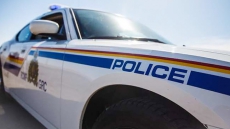VICTORIA — Alaska's lieutenant-governor will make an extraordinary visit to the British Columbia mine at the centre of an environmental disaster in an effort to ensure his state won't be damaged by a similar catastrophe.
Alaskans have been voicing concerns about B.C.'s plans to expand mining in the province's north, saying B.C.'s upstream mines could harm the valuable salmon rivers that flow into Alaska.
Lt.-Gov. Byron Mallott will visit the Mount Polley mine next week, the site where a tailings dam at the gold and copper mine in central B.C. collapsed last summer spilling millions of cubic metres of mine waste into area waterways.
Mallott will also meet with officials in B.C.'s ministries of energy and mines, environment and aboriginal relations during a stop in Victoria.
A statement released Friday by Alaska State Governor Bill Walker said Mallott will attend a Vancouver Board of Trade mining week luncheon and meet with mining industry officials and First Nations.
"As neighbours, we have many things in common and I want to strengthen the relationships we Alaskans have with British Columbia," said Mallott in the statement. "I look forward to this trip and seeing first-hand the Canadian side of the transboundary issues."
Mallott is a Tlingit First Nations leader and a former mayor of Juneau who ran for state governor as a Democrat, but during the election joined forces with Walker, who ran for governor as an independent. Mallott's elected position is similar to deputy leader.
Mallott said three of Alaska’s most important salmon rivers: Taku, Stikine, and Unuk are in watersheds that could be impacted by Canadian mines during the life of the mine, and through closure and reclamation.
"These rivers are key to southeast Alaska’s way of life including native cultures, community economies, recreation and subsistence, and, of course, its profitable seafood and tourism industries that employ thousands of people," stated Mallott, who was appointed earlier this year to lead an Alaska transboundary waters working group.
Vancouver-based Imperial Metals Corp., (TSX:III), which operates Mount Polley, was granted an interim permit in February to open the Red Criss Mine gold and copper mine in northern B.C. near the Stikine River — upstream from Alaskan waterways.
Alaskan concerns prompted B.C.'s Energy and Mines Minister Bill Bennett to travel to Alaska several times in recent months to ease fears about perceived loose B.C. mining regulations and the possibility of another Mount Polley-like disaster.
Bennett said Friday that Mallott will receive a complete briefing of B.C. mining policies.
An independent, government-ordered report concluded the spill was caused by an inadequately designed dam that didn’t account for drainage and erosion failures associated with glacial till beneath the pond.
Imperial Metals spokesman Steve Robertson said this week the company is seeking permit approval to reopen Mount Polley this summer.
Bennett said he would like to see B.C. Premier Christy Clark and Gov. Walker sign a memorandum of agreement to improve communication between the two governments.
"Let's make sure we give Alaska every opportunity to be involved in whatever B.C. is thinking about doing in the northwest."
A second delegation of First Nations leaders, commercial and sports fishing groups and conservation organizations from Alaska will also visit B.C. and Mount Polley next week. The Salmon Beyond Borders coalition says mining activities in northern B.C. threatens the livelihoods in southern Alaska.
Heather Hardcastle, who supplies fresh-caught Alaska salmon to markets, said there are deep concerns about a similar tailings pond at the Red Criss mine.
"Just knowing that Imperial is trying to figure out how to deal with the water at Mount Polley and then applying to reopen it as early as June, I think we're just kind of aghast," she said.




